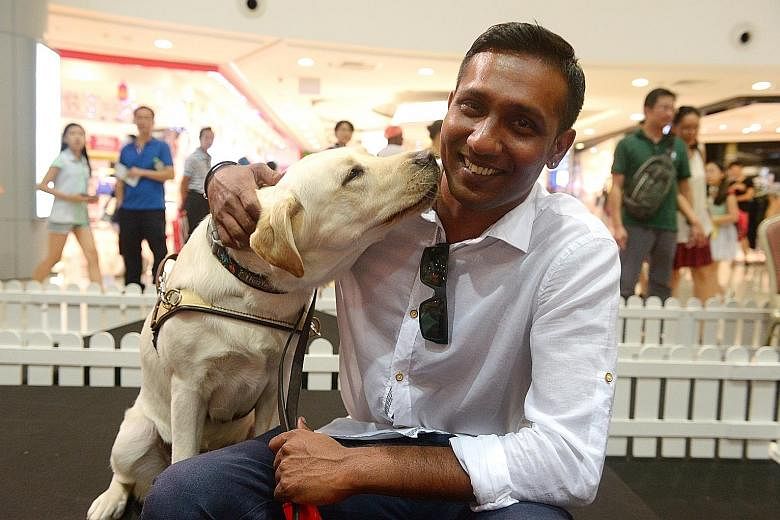From bottle-feeding two-month- old hyenas and walking pumas, to getting bitten by a vulture while holding it for a medical examination, Mr Wesley Eugene Paul is used to working with all kinds of animals.
He will soon be working with a smaller, more benign variety.
The 36-year-old animal lover is slated to become the first guide dog instructor in South-east Asia.
Mr Wesley, who used to work at the Night Safari, has been selected by the Guide Dogs Association of the Blind (GDAB) to go for an 18-month course in Melbourne, Australia, later this year .
Currently a freelance pilates instructor, he was chosen from 20 shortlisted candidates for the job, after three rounds of interviews.
Among the tasks he had to complete as part of his interview was to lead a blindfolded person to an end point through obstacles.
He also had to get a dog's attention and get it to move to him, when there was another instructor holding rewards in her hand.
"Animals are usually motivated by rewards, so I had to think of a way to get the dog to come to me even though I wasn't holding rewards," he said.
While his initial attempt to crawl on the ground to get the dog to move towards him was unsuccessful, he succeeded by improvising. He tied a doorstopper on a string and managed to entice the dog.
Mr Wesley grew up with a love for animals. "Perhaps it was the influence of my grandpa. I used to watch National Geographic with him as a child," he said.
He joined the Night Safari as a show presenter at 23,after national service. As part of his job, he has also trained staff on how to train animals. He recounted how he had to train a colleague who was diagnosed with a fear of snakes to handle these reptiles. By slowly growing the colleague's confidence in handling snakes, he managed to rid him of his fears. He said that such experiences will put him in good stead as a guide dog instructor.
"At this stage of my life, I would like to help other people. At the same time, I will still be working with animals. It's going to be intriguing because every single animal has a different character," he said.
Accredited guide dog instructors are able to train dogs to be qualified guides. They also assess a visually impaired person's mobility skills, pair him with a guide dog and teach him the proper way to handle and care for his guide dog.
"We wanted to build something sustainable, build local talents to serve the local community," said Mr Alvin Ching, GDAB's community partnership executive.
With no guide dog instructor based in Singapore, users of guide dogs here have had to travel to Australia with their dogs to undergo training, he noted.
But an accredited British part-time guide dog instructor, Ms Zara Linehan, does come to Singapore to serve the community here.
Mr Ching said it can be difficult for guide dogs trained overseas to adapt to Singapore's environment.
There are eight guide dogs in total here, with the eighth guide dog now training under Ms Linehan.
GDAB's efforts to expand its capabilities come as it celebrates its 10th anniversary. At an event at Causeway Point to mark the anniversary yesterday, NTUC FairPrice Cooperative chief executive Seah Kian Peng, an MP for Marine Parade GRC, said guide dogs help their handlers live life to the fullest potential.
"To a visually impaired person, a trained guide dog is more than a partner. It helps the user perform daily tasks such as walking to the nearest coffee shop for a meal or commute to and from work."

